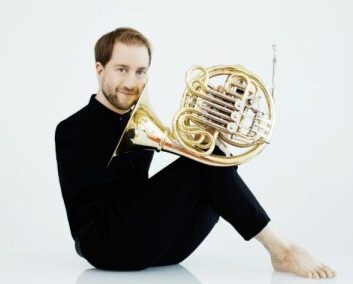‘We never said a word about the fact that I have no arms.’ Felix Klieser
In a world so often dominated by the self-pitying and the lunatic – the surely outrageous and incomprehensible lapse of justice in Kenosha leaps to mind – there are moments of relief in the triumphs of humanity, the indomitability and generosity of the many who transcend limits that would defeat the best of us, and who – if only we’d pay attention – challenge us to reappraise our own sense of the scale of human possibility.
I am thinking, this week, of Felix Klieser, having spotted the BBC report on the Bournemouth Symphony Orchestra beginning its autumn season with Klieser as its artist in residence.
‘The 30-year-old German professional hornist will tour with the orchestra for the next two years,’ the report says, adding matter of factly: ‘Felix was born without arms and plays the keys with his left foot.’
In this interview, he makes light of the impediment.
‘Everyone thinks that it should be so difficult to do with your foot. The funny thing about it is that I’m thinking the same with you. I can’t really understand how you can hold a pencil with these long fingers, because the coordination is so difficult.’
And yet, of course, overcoming his own difficulties has required immense effort and ingenuity – and tolerance of the incredulity of others.
‘Completely irritated’
When, as a toddler, he settled on wanting to play the horn (for reasons he can’t quite place), he was ‘completely irritated’ arriving for his first music lesson to find the music school principal ‘sitting in the room with a xylophone’.
He eventually got his way.
‘When I started at the age of four, the horn was on the floor and my upper body was just as long as the instrument. So the leadpipe was exactly at the right height. But when I got bigger, we very quickly came up with the idea of the tripod.’
A ‘much more central problem’ was not being able to put a hand in the bell of the horn, a procedure that ‘has an enormous influence on the sound, making it darker and rounder’.
‘As a ten-year-old I noticed that I sounded too bright, too much like a trumpet. And I realised very quickly that I had to get this under control if I wanted to play professionally.’
‘Never mattered’
He was undeterred – and, to their credit, so were his teachers. That he didn’t have hands, he recalled, ‘never mattered’. ‘We never said a word about the fact that I have no arms.’
What was critical was using his imagination – imagining the sound he sought, and with his lips making it ‘softer or darker’.
‘This is of course laborious and takes years.’
But there was a benefit, too.
‘The fact that I had to deal with the sound so early on meant that I am perhaps actually more sensitive to the subject than other musicians. A “forte” can sound “maestoso”, but it can also sound extremely brutal and harsh. A “piano” can appear lovely and sweet, but it can also send a cold shiver down your spine. It is precisely these differences that interest me. I would like to express this sophistication with my instrument.’
In Klieser, the evident absence of despair, the apparent refusal to tolerate inevitability, the acceptance that the task is ‘laborious and takes years’ all speak to an individual effort that is not contingent on the tormenting vagaries of social attitudes and fixations that so many of the rest of us allow to determine where we stand or how we behave.
Resolute independence
There is a lesson – and it’s not the stretch it might seem – that goes far beyond the concert hall: resolute independence of mind is the most dependable counter to what Garry Kasparov described last week as ‘mob mentality, groupthink, or punitive neo-Puritan orthodoxy’.
Writing in the Wall Street Journal, the Russian chess grandmaster, former World Chess Champion and founder in 2017 of the Renew Democracy Initiative, an American political organisation promoting and defending liberal democracy in the US, added: ‘It is the abuse of power—mostly social, not yet governmental—to silence debate and paralyze the spread of any ideas that challenge the prevailing ideological dogma. It is the coordinated, coercive attempt to win a debate by ending debate—to punish, not to educate.’
An armless 30-year-old hornist may not seem an obvious counterpoint to the maniacal obsessions of the right and the left, for each of whom their own dogmas are paramount. Yet, of course, he is.
If anything animates the liberal consciousness, it is the great power of the individual to live well, and to choose with generosity, resolve and imagination without limit. This is the most liberating agency there is.
If you like what you have just read, support the Daily Friend

